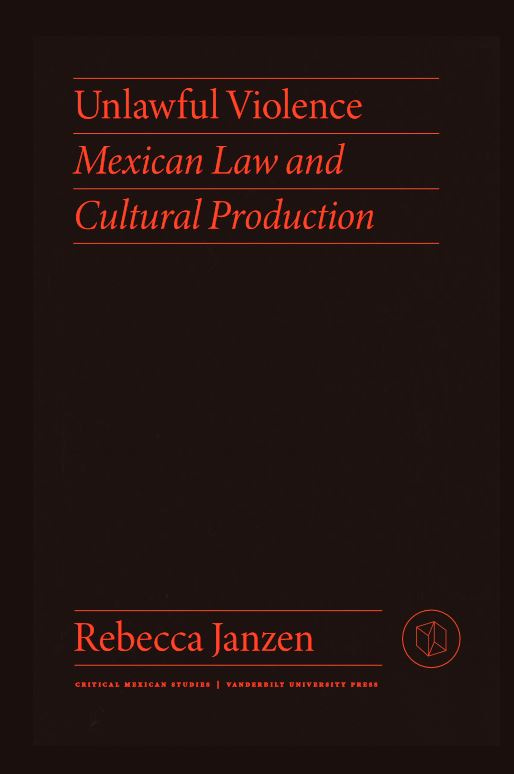Blood and culture
Unlawful Violence: Mexican Law and Cultural Production, Rebecca Janzen, reviewed by Gavin O'Toole
Unlawful Violence: Mexican Law and Cultural Production, Rebecca Janzen, 2022, Vanderbilt University Press
It is impossible to separate the hyper-violence that Mexico has experienced since the start of this century from the economic model that has been imposed on a country where democratic choices and institutional effectiveness are severely constrained.
Violence never occurs in a vacuum, and in every case reflects a sociopolitical order and mode of production that express the priorities of the elites who dominate a given system and use direct and indirect force to guarantee their control.
In short, the forms taken by violence are more a cultural reflection of the prevailing economic model—which, realistically, means capitalism—than an inherent trait of any given society: Mexicans are no more violent than other people, they simply occupy a social and economic space that has been made more violent than its comparators.
This is what Slavoj Žižek refers to as “objective violence”, a systemic brutality that exists insidiously and almost invisibly within the “normal state of things”, crucial to the functioning of our economic and political systems and tied to capitalist expansion.
As author Rebecca Janzen writes: “These forms of violence are a way that those in power accumulate even more power through the dispossession of those with less power. This is similar to how things have occurred in other moments of violence in the expansion of capital, accelerated and more obviously violent given the evolution of military technologies.”
To give a tragic example: between at least 100,000 people were murdered in Mexico during Felipe Calderón’s administration following his declaration of the war on drugs in 2006 and subsequent signing of the catastrophic Mérida Initiative.
The latter—notionally declared at an end by the current president—aligned the country squarely with the priorities of the US within just six years of Mexico’s so-called “transition” from single-party rule to competitive party politics.
This alignment benefited two of the most powerful actors in both countries—it can be understood as the product of successful lobbying by the US arms industry smarting from the loss of military markets in a democratising Latin America; and it empowered and enriched Mexico’s security establishment, the police and armed forces that faced oblivion through political reform.
Indeed, the cultural critic Oswaldo Zavala went as far as to argue in 2018 that Mexico’s “cartels” are a fiction, created to benefit those in power in the country and their counterparts in the US, and are in fact merely enterprises competing in an illicit market for drugs.
This intellectual shift towards a deconstruction of violence in the context of capitalism was evident as early as 2010 in the brilliant work by the Tijuana activist academic Sayak Valencia, translated into English as Gore Capitalism in the same year as Zavala’s book was published in Spain as Los cárteles no existen. Narcotráfico y cultura en México.
Valencia argued that the violence in Mexico has become a product within hyper-consumerist neoliberal capitalism, by which tortured and mutilated bodies are commodities to be traded for profit in an age of impunity and governmental austerity.
The cultural expression that this relationship between violence and capitalism finds is at the heart of Janzen’s Unlawful Violence: Mexican Law and Cultural Production.
The author undertakes a comparative critique of legal and literary texts in Mexico from 2000 to 2020 including the constitution, human rights laws, novels, and short stories. These all both explore and give voice to the reality of violence on the ground, while articulating hopes for a better future.
Janzen looks, for example, at Jorge Volpi’s 2018 Una novela criminal (A Novel Crime) that fictionalises the experiences of a Mexican man accused of murder for a drug cartel, which includes key insights into the war on drugs against the backdrop of the federal government’s constitutional and penal reforms to deal with trafficking.
Janzen also compares legal texts with novels and short stories that deal with the experiences of violence of women, children and migrants, finding commonalities in form and genre that offer insights into 21st-century Mexico, not least a tension between description and aspiration.
Her book is an original and valuable effort to deconstruct cultural production in Mexico in order to reveal the critically important—but insufficiently analysed—relationship between the criminal violence that has become a “background noise” in society, and the US-backed species of neoliberal capitalism imposed upon that society which generates that bloodshed.


